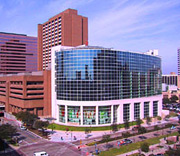Doctors Warn of Heat Dangers for
High-Risk People Like Heart Patients, the Very Young
HOUSTON, TX. (updated July 2015) – During summer when many are planning outdoor activities, doctors at Texas Heart Institute are warning about the risks of the intense summer heat, particularly for heart patients and those who might have undiagnosed heart conditions.
Anybody doing outside activities is at risk if they don't stay properly hydrated, but certain people are at greater risk, pointed out Dr. James T. Willerson, THI's president. This includes people who are obese, people with chronic illnesses who are taking certain medicines and people with low cardiac reserve whose hearts are unable to quickly adjust to the changes the body goes through in extreme heat, such as an increased heart rate.
"Heart failure patients and patients with significant heart disease often have low cardiac reserve. They can become dehydrated very easily, even just by sitting in a house that is too hot or walking outside in hot weather," said Dr. Willerson. "Heat can also elevate the heart rate and affect blood pressure in patients with significant heart disease."
Normally, the body cools itself by increasing blood flow to the skin. In hot weather, blood flow to the skin may increase by 3 times for healthy people. But for heart failure patients, the heart muscle may be too weak and the blood vessels in the skin may not be able to enlarge enough for heat to be released through the skin. That means that heart patients have greater difficulty controlling their body temperature.
Such people should not stay in a building without air conditioning or ride in a car without air conditioning, Willerson advised.
THI physicians also cautioned about wildfires in the region. Studies have found that particulates in wildfire smoke (alone or linked with other pollutants) can exacerbate problems for people with respiratory and cardiac conditions.
"Smoke from these fires can also include concentrations of carbon monoxide that, if it enters the bloodstream through the lungs, can reduce oxygen delivery to the heart and the body's other organs," said Dr. Willerson. "People with certain respiratory and cardiac diseases already have issues with low oxygen. Chest pains, arrhythmias (irregular heart rhythms), or even death can occur."
To learn more about risks from extreme heat and advice on how to cope with it, read the Heart Information Center topic, Hydration Tips, how to avoid heat exhaustion in hot and humid conditions.
For THI media profile, see
Public Affairs.



